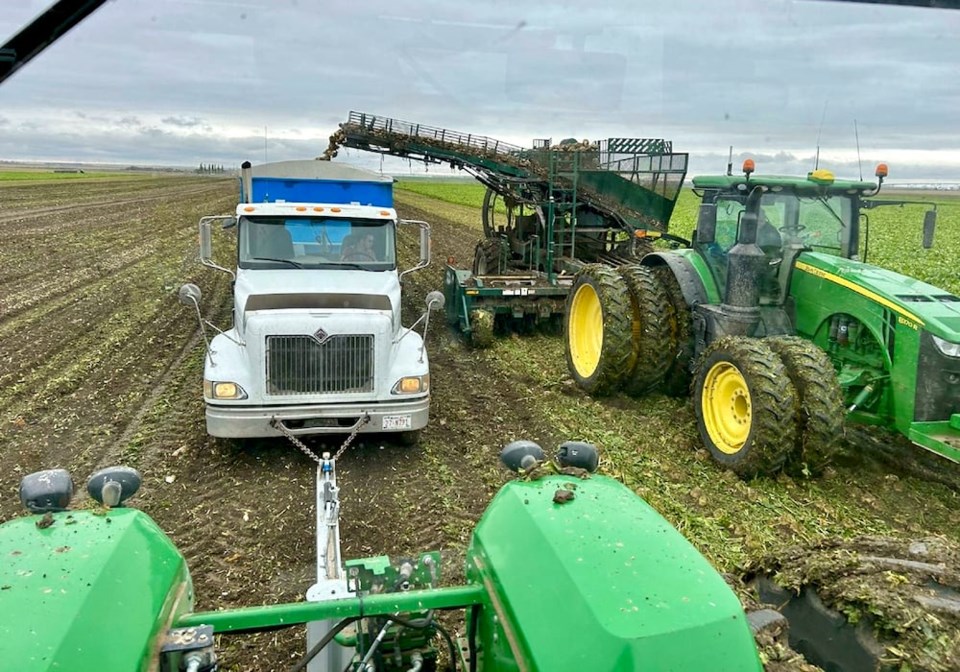A domestic sugar policy would help kickstart the Canadian and particularly the Albertan sugar industry, says a major player in the sector.
The Alberta Sugar Beet Growers want a national domestic sugar policy, which the organization says could lay the foundation for resurgence in the sector.
Such a policy would regulate the amount of sugar imported into Canada from cane sugar-producing countries like Brazil and India. That would shift focus to home-grown sugar beet production and processing.
“We’re the only G7 country that does not have a domestic sugar policy,” said Jennifer Crowson, the grower group’s executive director. “A sugar policy would protect the sugar beet market and the ability for us to expand the industry.”
The group says its growers produce only eight per cent of the sugar sold in Canada, while the remainder is imported cane sugar.
The immediate goal of a domestic sugar policy, as laid out by the Alberta group and its national counterpart, the Canadian Sugar Beet Growers Association, would be to double sugar beets’ market foothold to 16 per cent of national sugar consumption. This would drive investment in refineries and open new grower opportunities.
“Other provinces like Manitoba used to produce sugar beets. If there was a sugar policy, we would be able to expand the market and potentially have other provinces start growing sugar beets again,” said Crowson.
Corporations have expressed interest in building beet sugar infrastructure if there was a policy in place, she added.
“Other industry people and corporations say that, in the event that there was a policy, they would come and build another processing plant.”
There’s at least one major hurdle: federal approval of a policy. That process is coming along slowly, but surely, Crowson said.
“It’s been a work in progress for a while, but we have recently been able to have a few meetings with Agriculture and Agri-Food Canada,” she said. “We’re creating a working group going forward to look at some of the pieces of what domestic sugar policy could look like.”
Canadian sugar has featured in the news recently due to the ongoing strike at a Vancouver sugar processing facility that created a sugar shortage on store shelves.
Although a national sugar policy wouldn’t affect the chances of similar strike action, the expected industry growth could create more supply chain options in the event of disruption, proponents say.
“With the strike right now, the biggest factor is they’re just not operating, not that their source of sugar is not there,” said Crowson. “So as far as domestic sugar policy, it would secure that Canada has a more sustainable product right here that’s 100 per cent Canadian.”
The sugar beets under irrigation in southern Alberta and processed at the Lantic plant in Taber, Alta., represent almost the entirety of sugar production in Canada, said Crowson.
Rogers Sugar is the holding company of Lantic Inc., formed when Rogers Sugar Ltd. and Lantic Sugar Limited merged in 2008.
“There are beets that are grown in Ontario, but they’re exported to Michigan to be processed, so that doesn’t stay within Canada,” says Crowson. “So, we are the only source of 100 per cent Canadian sugar in Canada.”
Alberta’s sugar beet production comprises about 200 farm families who harvest about 840,000 tonnes of sugar beets every year.
There are three other sugar refineries under the company’s banner (Montreal, Vancouver and Toronto) but they process cane sugar sourced from India, Brazil and Vietnam.
Today, the Canadian sugar beet industry operates under a supply managed, quota-based system, said Crowson.
The ASBG manages these producer quotas from its permanent quota of 28,000-33,895 acres per year, depending on capacity of the Taber refinery. Contracted acreage can be reduced if the refinery is unable to process the permanent quota in a given year.
“The processor tells us how much we can grow each year and usually what happens is we end up with a 17 to 20 per cent reduction from our permanent quota,” she said.
“What that means, going into next year’s system, is out of that 33,895 acres, we’re going to have a 17 per cent reduction. That will be the maximum amount of acres our growers are able to grow.”
Any beets that don’t make it to the plant become a storage challenge for producers, she added. They have no other marketing options.
“The beets are stored in piles outside so as winter carries on, the beets do get frozen. That’s OK, but they can only stay frozen and still be a good product for so long. So come the end of February or beginning of March … those beets will start to deteriorate.”
In addition, it’s not uncommon in southern Alberta to get sudden stretches of warm weather that hasten beet deterioration.
The latest harvest in November brought in 856,636 tonnes at an extractable sugar rate of just over 17 per cent.
Yield was high, considering that the number of planted acres was down. Due to weather and the lateness of the processor contract, producers grew 26,000 acres as opposed to the typical 28,000, Crowson noted.



.png;w=120;h=80;mode=crop)